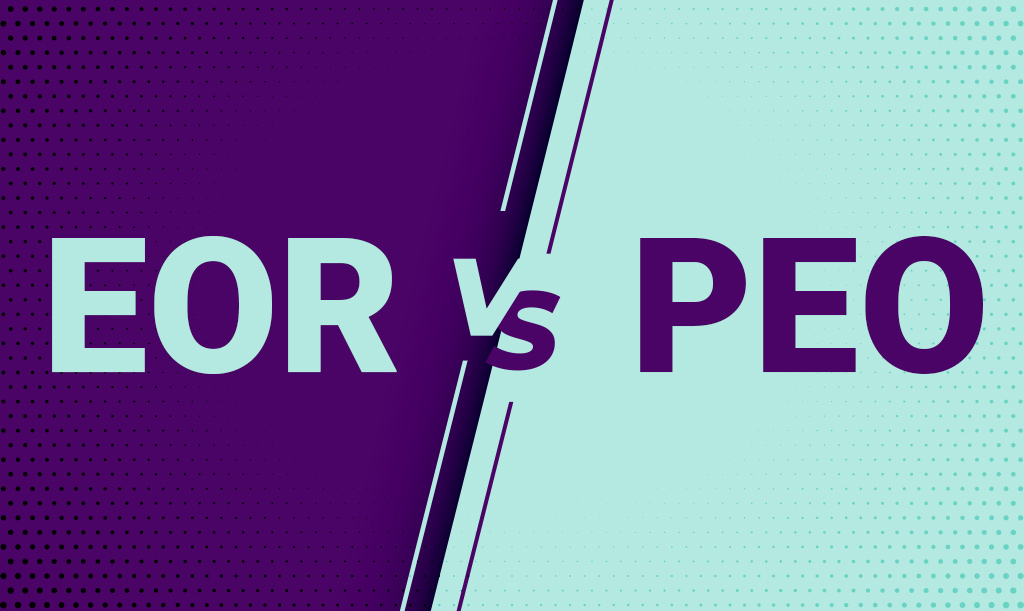- An EOR is a company that legally employs workers on your firm's behalf, while a PEO is a company that shares employer responsibilities with your firm.
- EORs simplify global compliance while PEOs ease HR administration. Both EOR and PEO come with limitations, from hidden costs to restricted control and mismatched services.
- EOR and PEO are mainly employment management models, but alternatives like outsourcing are more work-focused with ready-made teams and systems.
Accounting firms have diverse staffing needs, which is why employment models like Employer of Record or EOR and Professional Employer Organization or PEO exist: to let firm owners customize their staffing approach and choose the one that best fits their scale, budget, and long-term goals.
Though often used interchangeably, EOR and PEO have distinct roles and advantages. In this blog, we’ll break down their differences and outline the benefits and risks of each model, as well as an alternative to EOR and PEO: outsourcing.
The Difference Between EOR and PEO
Let’s compare and contrast EOR and PEO before anything else. To make sure you don’t mix them up, we’ve created a clear side-by-side comparison table showing their key differences.
| EOR | PEO |
|---|---|
| EOR is the legal employer | You are still the legal employer |
| In charge of legal compliance | Shares legal compliance with your firm |
| Doesn't need a local entity | Needs a local entity |
| Handles functions like payroll processing and benefits management | Shares functions like payroll processing and benefits management with your firm |
An employer of record or EOR is a company that legally employs workers on your firm’s behalf. In contrast, a professional employer organisation or PEO is a company that shares employer responsibilities with your firm.
EORs are fully responsible for ensuring compliance and handling human resources (HR) functions like monthly payroll and employee benefits, while PEOs share these functions with your accounting firm.
Let’s dive more into what each of the two models can offer your accounting practice.
Employer of Record (EOR)
The initial roots of EOR services trace back to early payroll and leasing services. Today, employer of record (EOR) companies have been shaped by globalisation and refined by digital tools, offering a slew of advantages to your accounting firm, as well as certain limitations you should consider.
| EOR Benefits vs Limitations | |
|---|---|
| Benefits of EOR | Limitations of EOR |
| Your firm saves more money | You don’t control payroll processes, which can frustrate firm leaders used to hands-on oversight |
| Onboards talent in days instead of months, especially useful in new countries | Your firm is at risk if you rely too heavily on your partner |
| Employees tend to stay longer in the firm | Your employees may feel that they work for the EOR, not your firm |
| Your firm aligns better with existing laws and industry rules | Risk of teams feeling disconnected from your company culture |
EOR companies help you cut costs by removing the need for a local entity and giving you access to skilled talent in low-cost regions. Their on-the-ground expertise on tax regulations and local employment laws keeps you protected from legal risks, too.
With their own people and systems, EORs have a quicker hiring process, gladly taking on responsibilities like onboarding and training staff on your behalf. Meanwhile, in terms of retention rates, employees in EORs also tend to stay longer in their companies, demonstrating loyalty and appreciation for the firms they work for.
But while EORs offer clear advantages, they’re not without drawbacks. If you prefer a hands-on approach, you may find the reduced control challenging, on top of the heavy reliance on a single EOR, which can pose risks to your business continuity. You may also lose some brand visibility in the local market, with the EOR being your talent teams’ legal employer. This could create a potential disconnect between your team and your firm’s operations.
When to Use EOR
Choose EOR services if you have a large-scale accounting firm that lacks a legal entity in another country and needs to scale quickly. EOR is perfect for testing new markets and gaining access to talent pools globally.
Professional Employer Organisation (PEO)
The professional employer organisation (PEO) model began as co-employment services to handle payroll, benefits, and HR for growing businesses. Today, PEOs are a mature, regulated industry, serving firms across all industries. Just like EORs, PEOs can also benefit your accounting firm in many ways, but not without a few considerations to look into.
| PEO Benefits vs Limitations | |
|---|---|
| Benefits of PEO | Limitations of PEO |
| You cut down on admin load | You risk conflicts when your policies don’t align |
| You save on HR costs | You don’t have hands-on control over functions |
| You free up your time to focus on strategy | There may be extra PEO fees that surprise you later |
PEO companies help your firm by sharing your HR administrative tasks, like recruiting and onboarding support, performance management tools, and employee relations. PEOs also slash HR costs because there’s bulk purchasing power, automated systems, and a reduced need for HR staff. When workload is split, you can focus your in-house team on higher-yield, more strategic tasks.
However, since PEOs work with many businesses, their HR policies and procedures could be misaligned with your company’s specific practices or values. Moreover, the PEO’s processes largely influence HR decisions rather than your firm’s processes, which can feel restrictive if you want complete autonomy. On top of this, there are also cost considerations, such as per-employee rates adding up or payroll percentage spikes.
When to Use PEO
Choose a PEO if you want more overall legal control of your operations. PEOs are ideal for firms that are already operating in another country but want to outsource certain functions, like payroll, benefits, and HR. PEOs are also a viable option for firms that need to split employer duties for enhanced focus on other business activities.
What Firms Get Wrong When Choosing Between EOR and PEO
Many firms misunderstand the difference between PEOs and EORs, often assuming they’re interchangeable when they’re not. To help you decide between the two, here are key points to consider:
- Cross-border compliance – A PEO can’t always cover international hires, while an EOR is built for it.
- Hidden costs – Some firms focus only on headline pricing and miss extra fees like benefits, onboarding, or offboarding costs.
- Misalignment with growth plans – Picking an EOR when you really need a PEO (or vice versa), which can limit scaling.
- Service scope – Firms often expect PEOs or EORs to handle areas like recruitment, training, or performance management, when those services typically fall outside their offering.
EOR or PEO? Which Countries Prefer Which?
In practice, certain countries tend to favor one model over the other (EOR vs PEO) more, based on how their labor laws, tax rules, and business entity requirements are structured. Here are some general patterns and examples:
Where EOR tends to be preferred
- Countries with strict legal entity/registration requirements
- Regions with complex or frequently changing labor laws, where compliance risk is high for foreign companies
- Areas where visa/work permit, taxation, and employment contracts are tightly regulated and where employers who are not local need a partner who understands local practice
Some examples include Asia-Pacific (e.g. Philippines, Vietnam, China, Indonesia). They use EOR for international hires because of regulatory complexity and entity setup issues.
Where PEO tends to be better suited
- Countries with easier and cheaper conditions for setting up a legal entity
- Jurisdictions that have clearer, stable labor/employment laws and benefit systems
- Countries with larger domestic markets, where companies are hiring locally rather than abroad
PEO is best used in countries and territories like the US, UK, Canada, Australia, and some parts of Western Europe. This is because these places generally have clearer employment regulations and easier entity setup.
EOR or PEO: Which Suits Your Firm Size?
| Firm Size | EOR Preference | PEO Preference |
|---|---|---|
| Small firms/startups (1 to 50 employees) |
||
| Mid-sized firms (51 to 250 employees) |
||
| Larger firms or enterprises (251+ employees) |
(for global teams) |
(for global teams) |
As seen in the table, small firms or startups often use EOR when hiring in new markets without entity setup, because PEOs typically have minimums that are hard to meet.
Meanwhile, PEOs are popular with small to medium firms, having enough workforce to benefit from co-employment, benefits, expertise, and admin overhead cost savings.
Finally, larger firms or enterprises typically employ EOR for their teams across the globe, while keeping HR in the PEO model.
Common Pitfalls in Choosing EOR and PEO
Many firms fall into the same traps when choosing between an EOR and a PEO, and the following are some of the most common ones:
- Confusing EOR and PEO roles
- Overlooking hidden costs
- Expecting services that aren’t included
- Misalignment with firm size, growth plans, or international needs
Getting help from outside providers can still be effective as long as you avoid the common pitfalls that trip up many firms. But if the limitations of EOR or PEO leave you unconvinced, it may be time to look beyond them. Exploring smarter options may not only give you more support, but the complete solution that your firm really needs.
An Alternative: Outsourced Talent Solutions

As effective and widely used as they are, EOR and PEO services come with limitations that result-focused firms can’t afford to ignore.
Instead of splitting compliance duties with a PEO or fully outsourcing employment to an EOR, outsourced talent solutions providers take it further by handling the work and not just the paperwork.
When you outsource, you hand off entire functions beyond HR, payroll, and compliance. It’s faster, leaner, and often more cost-effective because it gives you ready-made talent that can deliver results right away.
In sum, EOR and PEO both keep the work in-house but make the employment side easier. However, if you want to focus purely on outcomes, outsourcing to talent solutions providers is your best bet.
If your goal is growth, efficiency, and results, outsourcing stands out as the smarter, more sustainable choice.
FAQs
Got more questions about EOR and PEO? Our FAQ section clears up common misconceptions, explains key terms, and answers the most frequently asked questions to help you choose the right model for your firm.
What's the main difference between EOR, PEO, and outsourced talent providers?
With an EOR, you manage the work while they handle legal employment in other jurisdictions. With a PEO, you manage the work while they share HR and compliance duties, but you need a local entity. With outsourced talent providers, they manage both the work and the people, while you oversee the results.
Which is the best option among EOR, PEO, and outsourcing?
If you need help with global compliance, EOR is the ideal option. If you want to ease HR administration, PEO is your best bet. If your goals are growth, efficiency, and results, outsourcing stands out as the smartest and most sustainable choice.
The Smarter Way to Build Your Team
EOR and PEO help you employ people, but outsourcing gets the work done. Outsourcing provides end-to-end solutions built to meet your firm’s needs today while laying the foundation for long-term success.
Transform your firm with outsourcing. Book a chat with us to know more.























